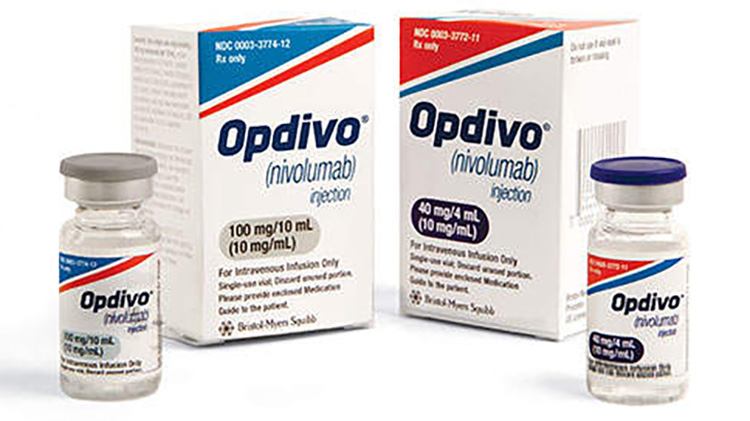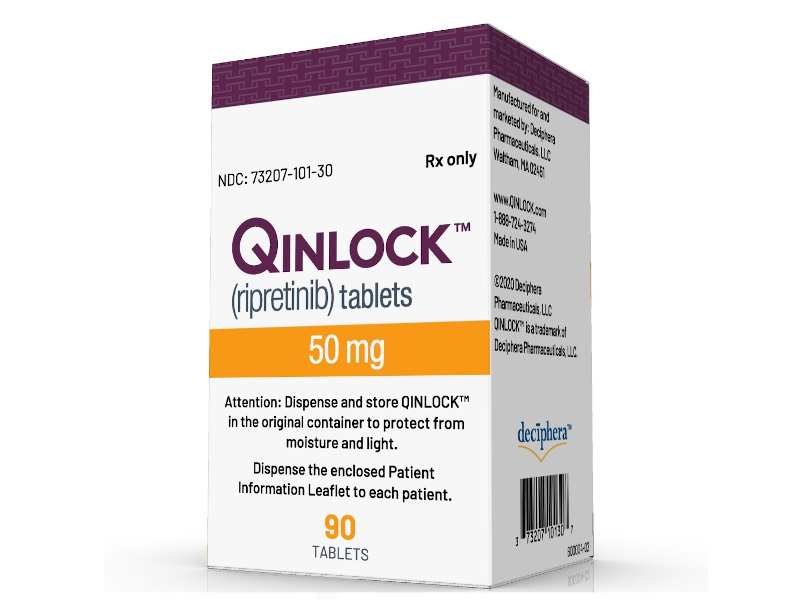Opdivo (Nivolumab) vs Qinlock (ripretinib)
Opdivo (Nivolumab) vs Qinlock (ripretinib)
Opdivo (nivolumab) is an immune checkpoint inhibitor specifically targeting the PD-1 pathway, used to treat various forms of cancer, including melanoma, lung cancer, and kidney cancer, by enhancing the body's immune response against cancer cells. Qinlock (ripretinib), on the other hand, is a kinase inhibitor used for the treatment of advanced gastrointestinal stromal tumors (GIST) after other treatments have failed, and it works by blocking the action of proteins that promote cancer cell growth. The choice between Opdivo and Qinlock would depend on the specific type of cancer a patient has, as they are approved for different indications and operate through distinct mechanisms of action.
Difference between Opdivo and Qinlock
| Metric | Opdivo (Nivolumab) | Qinlock (ripretinib) |
|---|---|---|
| Generic name | Nivolumab | Ripretinib |
| Indications | Various types of cancers, including melanoma, non-small cell lung cancer, renal cell carcinoma, classical Hodgkin lymphoma, squamous cell carcinoma of the head and neck, urothelial carcinoma, colorectal cancer, hepatocellular carcinoma, esophageal squamous cell carcinoma, and malignant pleural mesothelioma | Advanced gastrointestinal stromal tumor (GIST) who have received prior treatment with 3 or more kinase inhibitors, including imatinib |
| Mechanism of action | Programmed death receptor-1 (PD-1) blocking antibody, which enhances the immune system's ability to fight cancer | KIT and PDGFRα kinase switch control inhibitor, which helps to slow down the growth of cancer cells |
| Brand names | Opdivo | Qinlock |
| Administrative route | Intravenous infusion | Oral |
| Side effects | Fatigue, rash, musculoskeletal pain, pruritus, diarrhea, nausea, weakness, cough, dyspnea, decreased appetite, and others | Alopecia, fatigue, nausea, abdominal pain, constipation, myalgia, diarrhea, decreased appetite, vomiting, and others |
| Contraindications | Known hypersensitivity to nivolumab or any of its excipients | Known hypersensitivity to ripretinib or any of its excipients |
| Drug class | Immune checkpoint inhibitor, monoclonal antibody | Tyrosine kinase inhibitor |
| Manufacturer | Bristol Myers Squibb | Deciphera Pharmaceuticals |
Efficacy
Efficacy of Opdivo (Nivolumab) in Gastric Cancer
Opdivo (nivolumab) is an immune checkpoint inhibitor that has shown efficacy in the treatment of gastric cancer. It is a programmed death-1 (PD-1) blocking antibody that enhances the immune system's ability to fight cancer cells. In clinical trials, nivolumab has demonstrated improved survival rates in patients with advanced gastric cancer who have previously received two or more chemotherapy regimens. The ATTRACTION-2 trial, a pivotal study conducted in Asia, showed that nivolumab significantly improved overall survival compared to placebo in patients with advanced gastric or gastroesophageal junction cancer.
Further supporting its efficacy, the CheckMate-649 trial evaluated nivolumab in combination with chemotherapy as a first-line treatment for advanced gastric cancer, gastroesophageal junction cancer, and esophageal adenocarcinoma. The results indicated that the combination led to a significant improvement in overall survival and progression-free survival compared to chemotherapy alone. Consequently, the use of nivolumab in combination with chemotherapy has become a promising option for the first-line treatment of advanced gastric cancer in certain patient populations.
Efficacy of Qinlock (ripretinib) in Gastric Cancer
Qinlock (ripretinib) is a kinase inhibitor that has been approved for the treatment of advanced gastrointestinal stromal tumors (GIST), which can occur in the stomach. However, its efficacy specifically in gastric cancer that is not GIST is less established. Ripretinib works by inhibiting a range of kinases known to promote cancer growth, including KIT and PDGFRα, which are commonly mutated in GIST. While ripretinib has shown substantial efficacy in GIST patients, its role in treating non-GIST gastric cancer is not clearly defined and would be considered off-label use.
For patients with GIST originating in the stomach, ripretinib has been evaluated in clinical trials such as the INVICTUS study, which demonstrated its effectiveness in improving progression-free survival in patients with advanced GIST who had received prior treatment with other FDA-approved targeted therapies. Although these results are promising for GIST, the efficacy of ripretinib for other types of gastric cancer remains to be determined through further clinical investigation. Currently, ripretinib is not a standard treatment for gastric cancer outside of the GIST subtype.
Regulatory Agency Approvals
Opdivo
-
European Medical Agency (EMA), European Union

-
Food and Drug Administration (FDA), USA

-
Health Canada

-
Pharmaceuticals and Medical Devices Agency (PMDA), Japan

-
Therapeutic Goods Administration (TGA), Australia

-
Medsafe (NZ)

Qinlock
-
European Medical Agency (EMA), European Union

-
Food and Drug Administration (FDA), USA

-
Health Canada

-
Therapeutic Goods Administration (TGA), Australia

Access Opdivo or Qinlock today
If Opdivo or Qinlock are not approved or available in your country (e.g. due to supply issues), you can access them via Everyone.org.
How it works

Make an enquiry
Choose the medicine you want to buy, answer a couple of questions, and upload your prescription to speed things up. We’ll get back to you within 24 hours.


Make an enquiry
Choose the medicine you want to buy, answer a couple of questions, and upload your prescription to speed things up. We’ll get back to you within 24 hours.


Breeze through the paperwork
We'll guide you through the required documents for importing unapproved medicine, ensuring you have all the necessary information.


Get a personalized quote
We’ll prepare a quote for you, including medicine costs and any shipping, administrative, or import fees that may apply.


Receive your medicine
Accept the quote and we’ll handle the rest - sourcing and safely delivering your medicine.

Some text on this page has been automatically generated. Speak to your physician before you start a new treatment or medication.
Let's talk
If you have any questions, call us or send us a message through WhatsApp or email:
Contact us




